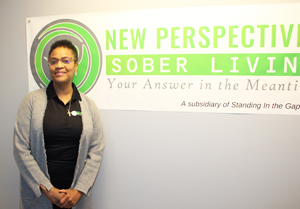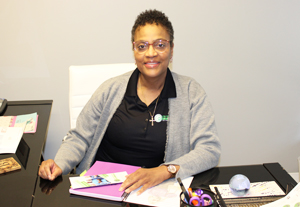
By Asia Nail
The Truth Reporter
Addiction is a complex and multifaceted experience.
At first use, drugs or alcohol may feel intense and exciting with rushes of dopamine flooding the brain. However, as addiction sets in overtime, things change. The high becomes more fleeting, and as years goes by the need for the substance can become all-consuming.
Deciding to get sober can be the hardest experience of one’s life. Yet, when someone is determined, he can overcome addiction with detox and rehabilitation.
“After the first six months of sobriety, people often face a new set of challenges,” explains Arlene Ford-Bond, director and CEO of New Perspectives Sober Living.
These challenges can be just as difficult to overcome as the initial struggle to get clean, she shares. Getting sober is often the first and most challenging step in overcoming addiction, but it is not the end of the journey. Staying sober can be even harder.
“New Perspectives exists to provide an alternative, temporary supportive environment for adult men ages 18 years or older, who are currently in recovery from a wide variety of drug and/or alcohol addiction,” says Ford-Bond.
Their services include: virtual and in-person behavioral modification courses, sobriety coaching and individualized holistic plans of care with goal-oriented & solution-focused therapies. “What sets us apart is our commitment to providing after-care services,” says Arlene. “This means if someone is still struggling to maintain sobriety after their release from an authorized rehabilitation program, they are still eligible to receive services from New Perspectives.”

Arlene Ford-Bond, RN BSN MOL, is a retired registered nurse with over 30 years of experience working with the ProMedica Hospital group. She spent her nursing career caring for the needs of the most critical patients serving as an ICU nurse in post-anesthesia care. Her dedication to lifelong learning led her to return to school a few years before her retirement and she went on to earn her master’s degree in Organizational Leadership from Lourdes University.
“Over the course of my career, I’ve served as Nurse Manager, Clinician, and a Patient Care Supervisor, among others,” she said. “I went from serving as Lourdes Adjunct Faculty, teaching clinical procedures to prospective nurses, to now fulfilling my dream of helping men struggling with addiction.”
Ford-Bond is keenly aware of the lack of affordable services available to men, in particular, who are struggling to maintain sobriety.
“I had a family member struggling with addiction. I personally assisted in transitioning them from in-patient to out-patient care,” she shares. “I learned first hand that women often have children in the home and are usually prioritized over the men here in Toledo. New Perspectives Sober Living is here to help fill that void. We are: Your Answer In The Meantime.”
New Perspectives serves Toledo residents by helping the community’s men gain the skills to maintain a stable, productive life, free from drug and alcohol addiction.
As a chronic condition, addiction and recovery is a lifelong process. While getting sober involves a significant change in lifestyle and habits, staying sober requires sustained effort and ongoing commitment.
Addiction can also be deeply rooted in an individual’s psychological, emotional, and social factors, explains Ford-Bond. “Even after getting sober, people can experience triggers that may lead them to relapse. These triggers can be anything from stress to trauma to encountering old acquaintances who used to use with them.”
Managing and avoiding these triggers require coping skills as well as ongoing effort and support. “I named the sobriety center New Perspectives because refining one’s approach to sobriety involves making changes and adjustments that last long term.”
Here are some ways Ford-Bond and her clinical staff help people refine their approach to sobriety:
Reassessing triggers: Identifying the people, places, and situations that trigger cravings or temptations make a lasting difference. “Lifestyle changes that include diet, exercise, sleep, and stress management, when taken seriously, help to maintain positive results,” says Ford-Bond.
Finding new activities and interests: Although a focus on career choices may be suitable for some, finding new activities and interests can be a great way to refine one’s approach to sobriety. Ford-Bond recommends engaging in new hobbies or activities that provide a sense of purpose and fulfillment to maintain recovery.
Learning new coping skills: Developing new coping skills helps individuals better manage stress and difficult emotions, reducing the likelihood of relapse.
Staying connected with sober peers: Staying connected with sober peers can be a powerful tool for refining one’s approach to sobriety. Peer support can provide a sense of community, accountability, and encouragement to stay clean.
Seeking ongoing support: Sobriety is a lifelong process, and ongoing support is critical. Refining one’s approach to sobriety may involve seeking out new sources of support, such as therapy, support groups, or recovery coaching.
Addiction can leave people feeling lost and without direction. Though challenges may at times feel overwhelming, the road to sobriety is a journey worth taking. A commitment to long-term recovery requires consistent effort and ongoing support. If you or someone you know needs help maintaining sobriety contact New Perspectives Sober Living at 419-360-8251 or online at newperspectivessoberliving.org.
